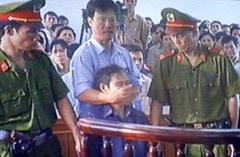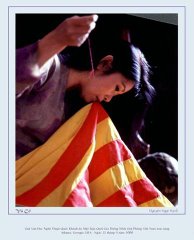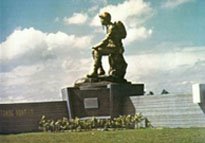By BEN STOCKING, Associated Press WriterWed Mar 28, 10:50 PM ET
For a short time last year, things were looking up for the tiny band of Vietnamese dissidents who dared challenge the Communist Party's monopoly on power. They circulated petitions for democracy, organized online, even formed political parties.
Now the window has slammed shut.
In recent weeks, police have arrested two well-known human rights lawyers in Hanoi, and Nguyen Van Ly, one of Vietnam's best-known dissidents, goes on trial Friday. Ly, a Catholic priest who was freed from prison less than 2 1/2 years ago, is now accused of crimes against the state.
Human rights groups say that other, lesser known dissidents are also suffering a new wave of police harassment.
The crackdown comes against a backdrop of two decades of increasing personal and religious liberty for ordinary Vietnamese. Day to day, they have more freedom to live, worship and work where they like, travel abroad, buy imported luxuries and listen to whatever music they choose.
But one thing remains constant: The Communist Party brooks no competition.
"They do not like unauthorized political activity, and they won't tolerate the formation of organizations that the state cannot control," said Carl Thayer, a Vietnam expert at the Australian Defence Force Academy.
Last year's thaw came as Vietnam prepared to host a Pacific Rim summit and stood on the threshold of joining the World Trade Organization.
Now, with the international spotlight gone, authorities apparently feel freer to crack down on those who don't toe the party line, according to diplomats, scholars and organizations that monitor human rights in Vietnam.
Very few of Vietnam's 84 million people seem eager to challenge the leadership. They have a long history of authoritarian government and tend to value stability over political freedoms. Most Vietnamese appear content that the economy is one of the world's fastest-growing, and two international polls find Vietnamese extremely upbeat about their nation's future.
Nevertheless, there are some signs of a new political assertiveness, most connected to corruption and land rights. The state-owned media was unusually aggressive in reporting on a corruption case in the Ministry of Transportation, and small groups have gathered publicly in Hanoi and Ho Chi Minh City, the former Saigon, to complain that the government took their land without fair compensation.
As the late-November APEC summit approached, activists used the Internet to promote the 8406 Bloc — named for its founding date — and reported collecting hundreds of signatures on a petition calling for a multiparty state. A handful of new pro-democracy parties were established.
Police harassed them, but unlike in the past, none was sent to jail.
Then things changed.
On Feb. 18, police raided the home of Ly, the priest. They took hundreds of documents, six computers and 136 cell phone cards before transferring him from the central city of Hue to a rural parish where he remains under virtual house arrest.
Ly, 60, is a member of the outlawed Vietnam Progression Party. His previous imprisonment, in 2001, came after he openly called for linking U.S. trade with Vietnam to Hanoi's human rights record.
He was sentenced to 15 years in prison, but was released in January, 2005 along with other dissidents in an amnesty. Among those pressing for his release was Republican Sen. Sam Brownback (news, bio, voting record) of Kansas.
This time he is accused of trying to undermine the state because he was talking to overseas democracy activists about starting a political umbrella group.
As the Internet takes root in Vietnam, authorities are increasingly sensitive to contact between domestic and overseas democracy activists.
On March 6, they arrested human rights lawyers Nguyen Van Dai and Le Thi Cong Nhan, accusing them of violating a prohibition on distributing information deemed harmful to the state.
The U.S. Embassy and European Union states have voiced concern.
"Vietnam has now taken its place on the world economic stage, but its human rights record lags far behind," said Sophie Richardson, a spokeswoman for New York-based Human Rights Watch.
The government says Human Rights Watch routinely distorts the truth and insists it only arrests people who break the law.
While politics remains a touchy area, religious freedom has increased in recent years; Ly was apparently arrested because of his politics, not his religion.
Conflicts continue between the government and members of unsanctioned faiths. But most ordinary Vietnamese feel free to express their faith; Catholic churches and Buddhist temples are typically packed with worshippers.
The United States recently removed Vietnam from its list of the world's worst violators of religious freedom. Vietnam is talking to the Vatican about establishing diplomatic ties.
And Thich Nhat Hanh, a Buddhist monk exiled for nearly four decades, has visited twice in two years, drawing large crowds with his calls for national reconciliation.
But all this is scant consolation for political dissidents.
Shortly after lawyer Dai's arrest, one of his fellow dissidents abruptly cut off an online conversation with The Associated Press. "I have to go now," he said. "I'm afraid the police will come."
Freedom of Speech Under Communism

Favorite Videos
We Will NEVER Forget.....

Favorite Links
Gone...but not forgotten.



Why this Blog?
There are 2 main reasons for this site:
1) There are many young Vietnamese who care about issues concerning Vietnam and the Vietnamese Diaspora, but cannot, or are not very proficient, at reading Vietnamese. Therefore, this site compiles and disseminates these news in English, so that the new generation of Vietnamese around the world can become more aware and, thus, closer to issues in the homeland.
2) Young Vietnamese have many ideas, many differing views on the prospects to democratize and develop Vietnam. The argument for peaceful development verses demands for justice and human rights. Which comes first? Can a civil, peaceful society be built without foundations of social justice?
These are the issues YOU can debate on this site. But remember, say what you mean, and mean what you say, but don't be mean when you say it.
1) There are many young Vietnamese who care about issues concerning Vietnam and the Vietnamese Diaspora, but cannot, or are not very proficient, at reading Vietnamese. Therefore, this site compiles and disseminates these news in English, so that the new generation of Vietnamese around the world can become more aware and, thus, closer to issues in the homeland.
2) Young Vietnamese have many ideas, many differing views on the prospects to democratize and develop Vietnam. The argument for peaceful development verses demands for justice and human rights. Which comes first? Can a civil, peaceful society be built without foundations of social justice?
These are the issues YOU can debate on this site. But remember, say what you mean, and mean what you say, but don't be mean when you say it.
Blog Archive
-
▼
2007
(106)
-
▼
March
(28)
- A Show (and Tell) Trial in Vietnam
- Dissident Catholic Priest Sentenced to 8 years in ...
- Dissident Catholic priest challenges Vietnam court
- The Not-So-New Vietnam - Wall Street Journal
- Vietnam repeals detention practice
- Vietnam crackdown targets dissidents
- Some liberties thrive, but communist regime allows...
- Democracy Alert: Growing Repression in Vietnam
- Vietnam Security Forces Threaten Family Members Of...
- Vietnam: Getting Away With Murder (Human Rights Re...
- Vietnam Watch News Roundup -- March 25, 2007
- Vietnam Watch News Roundup -- March 23, 2007
- Vietnam rejects Human Rights Watch's ‘wrongful rem...
- Vietnam Watch News Roundup -- March 21, 2007
- Journey from the Fall opens this Friday
- Interview with the wife of attorney Le Quoc Quan a...
- Human Rights Watch condemns Vietnam "crackdown" on...
- Vietnam to Consider Freeing Journalist After Inqui...
- Top Vietnamese Buddhist Slams Detentions Amid Ongo...
- Authorities refuse to renew BBC correspondent’s visa
- Republican lawmakers blast Vietnam rights violatio...
- Rep. Lofgren Calls on Secretary of State Rice to A...
- Vietnam: Crackdown on Dissent in Wake of WTO and APEC
- Kinks in Vietnam's armour
- 3,000 workers at Taiwanese factory in Vietnam go o...
- Vietnam police arrest two dissident lawyers in Hanoi
- Vietnam's communist authorities' desperate repress...
- Vietnam: A Paradise Haunted by Human Rights Abuse
-
▼
March
(28)

No comments:
Post a Comment